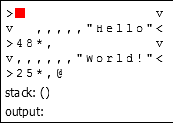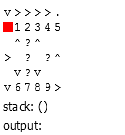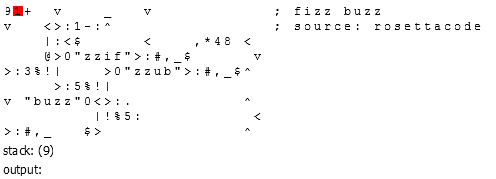Here’s a fun little bit of code for you:
55*4*v _ v
v <>:1-:^
|:<$ < ,*48 <
@>0"zzif">:#,_$ v
>:3%!| >0"zzub">:#,_$^
>:5%!|
v "buzz"0<>:. ^
|!%5: <
>:#,_ $> ^
Gibberish you say? No! Befuge!
More specifically:
Befunge is a stack-based, reflective, esoteric programming language. It differs from conventional languages in that programs are arranged on a two-dimensional grid. “Arrow” instructions direct the control flow to the left, right, up or down, and loops are constructed by sending the control flow in a cycle. It has been described as “a cross between Forth and Lemmings.”
There’s not much of a write up this time, since pretty much the entire code is the state machine that actually drives the language. We’ll go ahead and assume that we have a whole suite of helper functions (see GitHub for details):
wrapped-vector-ref-vector-refwhere indexes out of bounds wrapwrapped-vector-set!- likewise forvector-set!grid-ref- ref for a vector of vectors, using wrappinggrid-set!- set! for a vector of vectorsread-befunge- read a befunge program from inputwrite-befunge- write a befunge grid out for debugging
Next, we have the state of the machine. I’ll store it in a parameter, so we can access it from a number of helper functions (up in a bit):
State functions
; Befunge state
(struct state (x y facing stack grid running) #:transparent #:mutable)
(define current-state (make-parameter #f))
Next, said helpers to manipulate the stack, move the pointer, and get the current character. All of them are safe to use even if there is no current state, they just won’t do anything.
; Stack maniuplation. Pop 0 on an empty stack
(define (pop!)
(when (current-state)
(define stack (state-stack (current-state)))
(if (null? stack)
0
(begin0
(car stack)
(set-state-stack! (current-state) (cdr stack))))))
(define (push! v)
(when (current-state)
(set-state-stack! (current-state) (cons v (state-stack (current-state))))))
; Move in the current direction
(define (move!)
(when (current-state)
(case (state-facing (current-state))
[(right) (set-state-x! (current-state) (+ (state-x (current-state)) 1))]
[(left) (set-state-x! (current-state) (- (state-x (current-state)) 1))]
[(down) (set-state-y! (current-state) (+ (state-y (current-state)) 1))]
[(up) (set-state-y! (current-state) (- (state-y (current-state)) 1))])))
; Get the current character from the state
(define (grid-@)
(if (current-state)
(grid-ref (state-grid (current-state))
(state-x (current-state))
(state-y (current-state)))
#\space))
Stepper
Now it’s just a literal translation of the instructions into state transitions. I’ll have one function to advance the state to make it easier to make a debugging rendering function:
; Advance the befunge program to the next step
(define (step!)
(when (and (current-state) (state-running (current-state)))
; Decode the next instruction
(define cmd (grid-@))
(case cmd
; Push this number on the stack
[(#\0 #\1 #\2 #\3 #\4 #\5 #\6 #\7 #\8 #\9)
(push! (string->number (string cmd)))]
; Addition: Pop a and b, then push a+b
; Subtraction: Pop a and b, then push b-a
; Multiplication: Pop a and b, then push a*b
; Integer division: Pop a and b, then push b/a, rounded down. If a is zero, ask the user what result they want.[dubious – discuss]
; Modulo: Pop a and b, then push the remainder of the integer division of b/a. If a is zero, ask the user what result they want.[dubious – discuss]
; Greater than: Pop a and b, then push 1 if b>a, otherwise zero.
[(#\+ #\- #\* #\/ #\% #\`)
(define a (pop!))
(define b (pop!))
(define op (cdr (assoc cmd `((#\+ . ,+)
(#\- . ,-)
(#\* . ,*)
(#\/ . ,quotient)
(#\% . ,remainder)
(#\` . ,(λ (b a) (if (> b a) 1 0)))))))
(push! (op b a))]
; Logical NOT: Pop a value. If the value is zero, push 1; otherwise, push zero.
[(#\!)
(push! (if (zero? (pop!)) 1 0))]
; Change direction
[(#\> #\< #\^ #\v)
(set-state-facing! (current-state) (cdr (assoc cmd `((#\> . right)
(#\< . left)
(#\^ . up)
(#\v . down)))))]
; Start moving in a random cardinal direction
[(#\?)
(set-state-facing! (current-state) (list-ref `(right left up down) (random 4)))]
; Pop a value; move right if value=0, left otherwise
[(#\_)
(set-state-facing! (current-state) (if (zero? (pop!)) 'right 'left))]
; Pop a value; move down if value=0, up otherwise
[(#\|)
(set-state-facing! (current-state) (if (zero? (pop!)) 'down 'up))]
; Start string mode: push each character's ASCII value all the way up to the next "
; Note: uses one fuel
[(#\quote) ; (should be a quote character but that breaks syntax highlighting)
(let loop ()
(move!)
(define c (grid-@))
(when (not (equal? c #\quote)) ; ditto
(push! (char->integer c))
(loop)))]
; Duplicate value on top of the stack
[(#\:smile:
(define v (pop!))
(push! v)
(push! v)]
; Swap two values on top of the stack
[(#\\)
(define a (pop!))
(define b (pop!))
(push! a)
(push! b)]
; Pop value from the stack and discard it
[(#\$)
(pop!)]
; Pop value and output as an integer
[(#\.)
(display (pop!))
(display " ")]
; Pop value and output as ASCII character
[(#\,)
(display (integer->char (pop!)))]
; Trampoline: Skip next cell
[(#\#)
(move!)]
; A "put" call (a way to store a value for later use).
; Pop y, x and v, then change the character at the position (x,y)
; in the program to the character with ASCII value v
[(#\p)
(define y (pop!))
(define x (pop!))
(define v (pop!))
(grid-set! (state-grid (current-state))
x y
(with-handlers ([exn? (λ _ v)])
(integer->char v)))]
; A "get" call (a way to retrieve data in storage).
; Pop y and x, then push ASCII value of the character at that position in the program
[(#\g)
(define y (pop!))
(define x (pop!))
(define v (grid-@))
(push! (if (number? v) v (char->integer v)))]
; Ask user for a number and push it
[(#\&)
(display "Enter a number: ")
(push! (read))]
; Ask user for a character and push its ASCII value
[(#\~)
(display "Enter a character: ")
(push! (read-char))
(newline)]
; End program
[(#\@)
(set-state-running! (current-state) #f)])
(move!)))
There are a few interesting cases:
#\"- nested loop to read the rest of a string (counts as one ‘step’)#\\#- onemove!is called here, the next at the end of the function#\p- we’re extending support out to the full Unicode character set, but not every integer represents a code point, so for those store the number instead#\@- trust that the caller will actually check thestate-runningparameter
Main loop
Around that, we need a loop that just keeps calling step! until state-running is false. Something like this:
; Run a befunge program
(define (run-befunge [input (current-input-port)]
#:debug [debug #f]
#:fuel [fuel +inf.0])
; Load the grid
(define grid
(cond
[(input-port? input) (read-befunge input)]
[(string? input) (call-with-input-string input read-befunge)]
[(vector? input) input]))
; Set up initial state (x y facing stack grid running)
(parameterize ([current-state (state 0 0 'right '() grid #t)])
(let loop ([step 0])
(when (and (state-running (current-state))
(< step fuel))
(when debug
(write-befunge (state-grid (current-state)))
(printf "~a x ~a, ~a\nstack: ~a\n\n"
(state-x (current-state))
(state-y (current-state))
(state-facing (current-state))
(state-stack (current-state))))
(step!)
(loop (+ step 1))))))
I went ahead and stuck in a debug view (which will print out the grid, cursor, and stack on each step) and a limited fuel on the case that we don’t want to accidently run a program for forever.
Examples
And that’s all we need. Let’s test it with a few sample programs:
Hello World (Wikipedia)
> (run-befunge)
> v ; hello world
v ,,,,,"Hello"< ; source: wikipedia
>48*, v
v,,,,,,"World!"<
>25*,@
Hello World!
Hello World (Wikipedia)
> (run-befunge)
>25*"!dlrow ,olleH":v ; hello world v2
v:,_@ ; source: wikipedia
> ^
Hello, world!
Fizz Buzz (RosettaCode)
> (run-befunge)
55*4*v _ v ; fizz buzz
v <>:1-:^ ; source: rosettacode
|:<$ < ,*48 <
@>0"zzif">:#,_$ v
>:3%!| >0"zzub">:#,_$^
>:5%!|
v "buzz"0<>:. ^
|!%5: <
>:#,_ $> ^
1 2 fizz 4 buzz fizz 7 8 fizz buzz 11 fizz 13 14 fizzbuzz 16 17 fizz 19 buzz fizz 22 23 fizz buzz 26 fizz 28 29 fizzbuzz 31 32 fizz 34 buzz fizz 37 38 fizz buzz 41 fizz 43 44 fizzbuzz 46 47 fizz 49 buzz fizz 52 53 fizz buzz 56 fizz 58 59 fizzbuzz 61 62 fizz 64 buzz fizz 67 68 fizz buzz 71 fizz 73 74 fizzbuzz 76 77 fizz 79 buzz fizz 82 83 fizz buzz 86 fizz 88 89 fizzbuzz 91 92 fizz 94 buzz fizz 97 98 fizz buzz
Random digit generator (Wikipedia)
> (run-befunge #:fuel 1000)
v>>>>. ; random digit generator
12345 ; source: wikipedia
^?^
> ? ?^
v?v
v6789>
4 3 5 7 1 8 5 1 7 3 3 2 6 3 5 8 5 1 4 9 9 2 6 4 5
Looks pretty good from here!
Pretty pretty pictures
One last trick, let’s do much the same that we did a bit ago and make a rendering function:
Hello World (Wikipedia)

Random digit generator (Wikipedia)

Fizz Buzz (RosettaCode)
(Limited to 10 in interest of time)

And that’s it. Check out the full source on GitHub: befunge.rkt